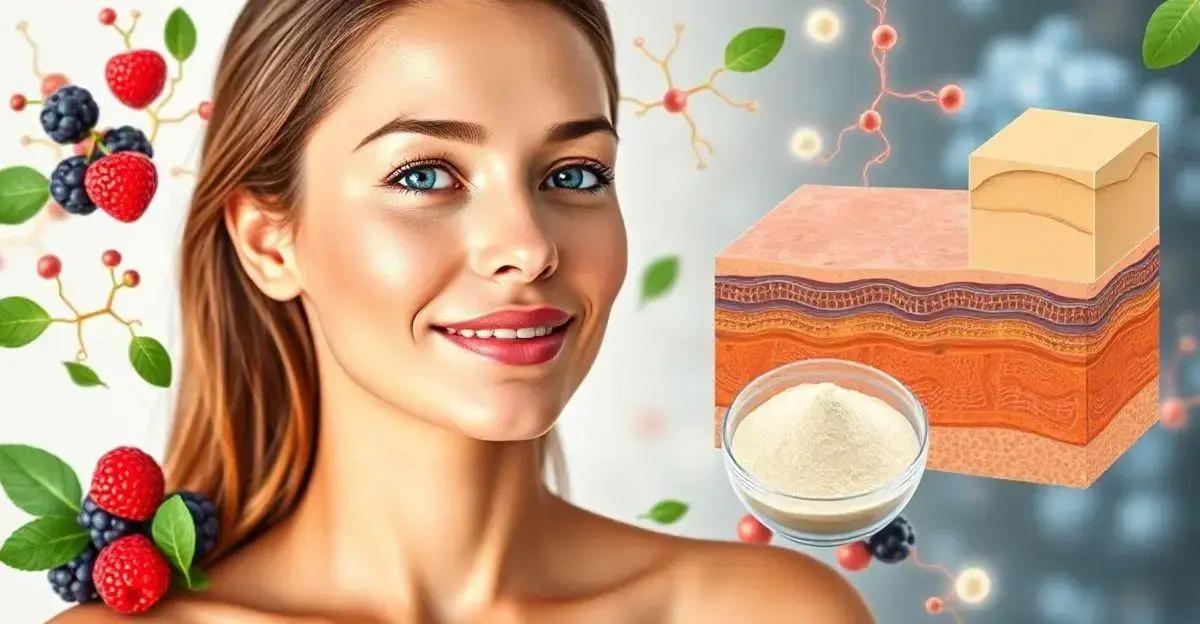Collagen is essential for skin health, providing structure and elasticity, but its production decreases with age, leading to wrinkles and sagging. To boost collagen, consume a diet rich in protein, vitamin C, and antioxidants, stay hydrated, and consider hydrolyzed collagen supplements. Protecting skin from UV damage, getting adequate sleep, and managing stress are also important for maintaining collagen levels and promoting youthful skin.
Healthy collagen is essential for maintaining youthful, vibrant skin. As we age, our bodies produce less collagen, leading to wrinkles and sagging. This article explores the amazing benefits of healthy collagen, from improving skin elasticity to promoting hydration. Let’s dive into how incorporating collagen into your routine can make a world of difference!
What is Collagen?
Collagen is the most abundant protein in our bodies, making up about 30% of the total protein content. It plays a crucial role in providing structure and strength to our skin, bones, muscles, tendons, and ligaments. Think of collagen as the framework that holds everything together.
There are several types of collagen, with Type I being the most common and found primarily in skin, bones, and tendons. Type II is mainly found in cartilage, while Type III is found in skin and blood vessels. As we age, our bodies naturally produce less collagen, which can lead to visible signs of aging such as wrinkles and sagging skin.
Besides aging, factors such as poor diet, smoking, excessive sun exposure, and high sugar intake can also contribute to the depletion of collagen levels. This is why many people are turning to collagen supplements and foods rich in collagen to help maintain skin elasticity and overall health.
In short, understanding collagen and its importance is the first step in taking proactive measures to ensure your skin and body stay youthful and vibrant for years to come.

How Collagen Benefits Skin Health
Collagen offers a multitude of benefits that are essential for maintaining skin health. Here are some of the key ways it helps:
- Improves Skin Elasticity: As collagen levels increase, skin elasticity improves, making it firmer and more resilient. This can significantly reduce the appearance of fine lines and wrinkles.
- Hydrates the Skin: Collagen helps retain moisture in the skin, which is critical for a plump and youthful appearance. When skin is well-hydrated, it looks healthier and more radiant.
- Promotes Wound Healing: Collagen plays a vital role in the body’s healing process. By supporting the structure of the skin, it can help wounds heal faster and reduce scarring.
- Reduces Signs of Aging: Increasing collagen levels can visibly reduce signs of aging, such as sagging skin and uneven texture, giving you a more youthful look overall.
- Supports Skin Barrier Function: Collagen helps strengthen the skin barrier, which protects against environmental aggressors like pollution and UV rays. A strong barrier is essential for overall skin health.
- Enhances Skin Tone: By improving circulation and hydration, collagen can lead to a more even skin tone and a healthy glow.
Incorporating collagen into your skincare routine—whether through diet, supplements, or topical products—can lead to noticeable improvements in skin health and appearance.
Top Sources of Healthy Collagen
If you’re looking to boost your collagen levels, knowing where to find healthy sources is key. Here are some of the top sources of healthy collagen:
- Bone Broth: Made by simmering the bones and connective tissues of animals, bone broth is rich in collagen and other nutrients. It’s an excellent source that can easily be incorporated into soups and stews.
- Fish and Shellfish: Fish, especially those with skin, such as salmon and mackerel, are great sources of collagen. They also provide omega-3 fatty acids, which are beneficial for skin health.
- Poultry: Chicken and turkey are not only rich in protein but also contain connective tissues that provide collagen. Incorporating chicken broth or roasted poultry into your meals can help boost your collagen intake.
- Eggs: Egg whites contain proline, an amino acid that is important for collagen production. Including eggs in your diet can support your body’s natural collagen synthesis.
- Dairy Products: Milk, cheese, and yogurt are good sources of protein and can contribute to collagen production. They also provide essential nutrients for overall skin health.
- Leafy Greens: Vegetables like spinach, kale, and Swiss chard are packed with vitamins and minerals that help in collagen synthesis. They contain antioxidants that protect collagen from damage.
- Berries: Berries like strawberries, blueberries, and blackberries are rich in vitamin C, which is crucial for collagen production. They also provide antioxidants that help combat skin aging.
- Nuts and Seeds: Nuts, such as almonds and walnuts, along with seeds like chia and flaxseeds, provide essential fatty acids and nutrients that support collagen production.
Incorporating these foods into your diet can help ensure that your body has the necessary building blocks for collagen production, promoting healthier skin and overall well-being.

Collagen Supplements: Do They Work?
Collagen supplements have gained immense popularity in recent years, with many people turning to them for improved skin health, joint support, and overall wellness. But do they really work? Let’s explore the effectiveness of collagen supplements:
- Types of Collagen Supplements: Collagen supplements typically come in two forms: powders and capsules. Powders can be easily mixed into drinks or foods, while capsules provide a convenient option for on-the-go use. Most supplements contain hydrolyzed collagen, which is broken down into smaller peptides for better absorption.
- Scientific Backing: Research indicates that collagen supplements can enhance skin elasticity, hydration, and overall texture. Studies have shown improvements in skin firmness and a reduction in wrinkles after consistent use over several weeks.
- Joint and Bone Health: Beyond skin benefits, collagen supplements may also support joint health by reducing pain and improving function in individuals with osteoarthritis. They provide the necessary amino acids that help maintain cartilage integrity.
- Absorption Rates: While some studies suggest that collagen peptides can be absorbed by the body, factors like age, diet, and gut health can influence absorption rates. It’s essential to pair collagen supplements with a balanced diet for optimal results.
- Timing and Dosage: For collagen supplements to be effective, consistency is key. Most experts recommend taking about 10 grams of collagen per day. It’s advisable to follow the manufacturer’s instructions for the best outcomes.
- Considerations: While collagen supplements can be beneficial, they should not replace a healthy diet rich in natural collagen sources. Additionally, individuals with dietary restrictions should choose supplements that align with their needs.
In summary, collagen supplements can indeed work for many individuals, especially when combined with a nutritious diet and a healthy lifestyle. However, results may vary, and it’s always wise to consult with a healthcare provider before starting any new supplement regimen.
The Role of Diet in Collagen Production
Your diet plays a pivotal role in collagen production—what you eat can significantly impact your body’s ability to generate this essential protein. Here’s how diet influences collagen synthesis:
- Amino Acids: Collagen is made up of amino acids, particularly glycine, proline, and hydroxyproline. Consuming protein-rich foods like meat, fish, eggs, and dairy provides your body with the necessary amino acids to produce collagen.
- Vitamin C: This vitamin is crucial for collagen production, as it helps in the formation of collagen fibers. Foods rich in vitamin C, such as oranges, strawberries, kiwi, bell peppers, and broccoli, are essential for optimal collagen synthesis.
- Antioxidants: Antioxidants protect collagen from damage caused by free radicals. Foods high in antioxidants, like berries, green tea, and dark chocolate, can help preserve your collagen levels and support skin health.
- Minerals: Certain minerals, such as zinc and copper, are vital for collagen production. Foods like nuts, seeds, seafood, and whole grains can help ensure you’re getting these essential nutrients.
- Omega-3 Fatty Acids: These healthy fats, found in fish, flaxseeds, and walnuts, can also boost collagen production and maintain skin hydration, which is crucial for a youthful appearance.
- Avoiding Collagen-Destroying Foods: Some foods can hinder collagen production and lead to its breakdown. High-sugar diets, excessive alcohol, and processed foods can all contribute to reduced collagen levels, so it’s best to limit these in your diet.
Incorporating a balanced diet rich in these nutrients not only supports collagen production but also enhances overall skin health and vitality. Making mindful food choices can go a long way in maintaining your skin’s elasticity and youthful glow.

Tips for Boosting Collagen Naturally
If you’re looking to boost your collagen levels naturally, there are several effective strategies you can incorporate into your daily routine. Here are some tips to help enhance your body’s collagen production:
- Eat a Balanced Diet: Focus on consuming a variety of nutrient-dense foods that are rich in protein, vitamins, and minerals. Incorporate plenty of fruits and vegetables, especially those high in vitamin C and antioxidants.
- Stay Hydrated: Drinking plenty of water is crucial for maintaining skin hydration and elasticity. Aim for at least eight 8-ounce glasses of water a day to support overall skin health.
- Limit Sugar and Processed Foods: Excess sugar and processed foods can lead to collagen breakdown and skin aging. Try to reduce your intake of sugary snacks, sodas, and refined carbohydrates.
- Incorporate Collagen-Rich Foods: Include foods like bone broth, chicken skin, fish, eggs, and leafy green vegetables in your diet. These foods provide the building blocks necessary for collagen production.
- Consider Collagen Supplements: If you struggle to get enough collagen from your diet, consider taking collagen peptides or hydrolyzed collagen supplements to support your levels.
- Protect Your Skin: Use sunscreen daily to protect your skin from UV damage, which can break down collagen. Wearing protective clothing and seeking shade can also help maintain collagen levels.
- Get Enough Sleep: Aim for 7-9 hours of quality sleep each night. Sleep is essential for cellular repair and regeneration, including skin health and collagen production.
- Exercise Regularly: Physical activity boosts circulation, which helps deliver nutrients to the skin and promotes collagen synthesis. Aim for at least 150 minutes of moderate exercise each week.
- Manage Stress: Chronic stress can lead to hormonal imbalances that negatively impact collagen production. Incorporate stress-reducing activities like yoga, meditation, or deep breathing exercises into your routine.
By following these tips, you can naturally support your body’s collagen production and promote healthy, youthful skin. Small lifestyle changes can lead to significant improvements in your skin’s appearance and overall well-being.
Conclusion
Maintaining healthy collagen levels is crucial for achieving and preserving youthful, vibrant skin. By understanding the importance of collagen and how it benefits skin health, you can take proactive steps to support its production.
Incorporating collagen-rich foods into your diet, considering supplements, and adopting a healthy lifestyle filled with hydration, exercise, and stress management can all contribute to better collagen levels.
Ultimately, nurturing your body with the right nutrients and care will not only enhance your skin’s appearance but also promote overall health and well-being. Remember, investing in your skin today will pay off in the long run, giving you the confidence to shine at any age.
FAQ – Frequently Asked Questions about Collagen
What is collagen and why is it important for skin health?
Collagen is a protein that provides structure and elasticity to the skin. It’s essential for maintaining youthful, vibrant skin and reducing signs of aging.
How can I naturally boost my collagen levels?
You can boost collagen levels by eating a balanced diet rich in protein, vitamin C, and antioxidants, staying hydrated, and avoiding excessive sugar and processed foods.
Do collagen supplements really work?
Yes, studies indicate that collagen supplements can improve skin elasticity, hydration, and overall texture when taken consistently.
What foods are rich in collagen?
Foods like bone broth, fish, poultry, eggs, and leafy greens are great sources of collagen. Foods high in vitamin C and antioxidants also support collagen production.
How long does it take to see results from collagen supplements?
Results can vary, but many individuals notice improvements in skin texture and elasticity within 4 to 12 weeks of consistent use.
Can stress affect collagen production?
Yes, chronic stress can lead to hormonal imbalances that negatively impact collagen production, making stress management important for skin health.


